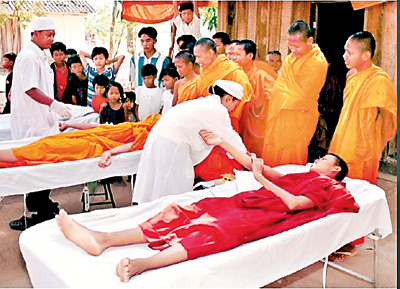“Thank you for saving my life”: World Blood Donor Day encourages volunteers
World Blood Donor Day (WBDD) falls today, June 14. The day is marked in Sri Lanka as well as worldwide. “Regionally we are celebrating on Monday, June 15 with many programmes keeping to the World Health Organisation (WHO) guidance parallel to the international events,” Dr. Gamini Karunadipathy, Consultant Transfusion Physician, Teaching Hospital, Peradeniya told the Sunday Times.
 “The aim of the World Blood Donor Day is to felicitate the voluntary blood donor population and give the message to the general public of the requirement of safe blood and encourage voluntary donors.” Every year the WHO selects a host country to celebrate World Blood Donor Day and a theme for the year. This year’s theme is “Thank you for saving my life”. “Last year Sri Lanka was selected as the global host and it was a very memorable day for us,” Dr. Karunadipathy said. The theme was “Safe blood for saving mothers.” Themes over the years have included “give the gift of life,” “Every blood donor is a hero” etc. The message is to raise awareness of the need for safe blood and is one of the official public health campaigns of the WHO.
“The aim of the World Blood Donor Day is to felicitate the voluntary blood donor population and give the message to the general public of the requirement of safe blood and encourage voluntary donors.” Every year the WHO selects a host country to celebrate World Blood Donor Day and a theme for the year. This year’s theme is “Thank you for saving my life”. “Last year Sri Lanka was selected as the global host and it was a very memorable day for us,” Dr. Karunadipathy said. The theme was “Safe blood for saving mothers.” Themes over the years have included “give the gift of life,” “Every blood donor is a hero” etc. The message is to raise awareness of the need for safe blood and is one of the official public health campaigns of the WHO.
On Monday, there will be a programme organised at the Peradeniya Teaching Hospital, the first time that the Blood Bank of the Peradeniya Teaching Hospital is conducting such a programme, after becoming a new Cluster Centre of the cluster system of the National Blood Transfusion Service. A selected number of regular voluntary donors and Blood donation campaign organisers will receive their certificates in appreciation of their continuous blood donations to the Blood Bank. “Regular voluntary donors are a national asset and the backbone of our blood supply. Therefore we should felicitate them,” Dr. Karunadipathy states, adding that they will be motivated and encouraged to continue their voluntary donations.
Mobile blood donor programmes are organised to increase awareness, motivate and encourage new donors. This is a very successful way of collecting blood. Registration of new donors and counselling will be important items in their agenda. Counselling is necessary to address common fears or misconceptions. There are many who wish to donate blood, Dr. Karunadipathy states, due to religious and cultural beliefs.
There are three groups of donors – Replacement Doors: relatives of patients who require blood, Paid Donors and Voluntary Unpaid blood donors. The WHO goal is for all countries to obtain all their blood supplies from voluntary unpaid donors. “Sri Lanka promotes voluntary blood donors and at present we collect only from voluntary donors,” Dr. Karunadipathy said.
The key to safe blood is safe donors. Voluntary, unpaid blood doors are people who give blood of their own free wll, without receiving any form of reward in cash or kind. Dr. Karunadipathy states that prevalence of infections like HIV, hepatitis viruses is lowest among voluntary unpaid doors. Healthy, volunteer blood donors make a commitment to give blood regularly. They are the safest donors as they are educated on healthy lifestyles and free from serious infections.
In 1665 blood transfusions were done from animals (dog) However, due to serious complications, animal to human transfusion was prohibited by law. In 1818, a successful transfusion of blood was performed by Dr. James Blundell -from a husband to his wife who was dying after childbirth due to severe bleeding. By a rare coincidence, perhaps, their blood group was the same. But later direct transfusions were not successful and it was banned.
Blood is a universal need. The demand is ever present. In 1901, Karl Landsteiner, an Austrian physician based in America, discovered the ABO blood group system. After this discovery, blood transfusion became a reality without complications. Landsteiner was awarded the Nobel Prize in 1930 for his great discovery in 1901. Marking Landsteiner’s birth date, June 14 was named World Blood Donor Day by the WHO. The first Blood Bank was established in 1932 in the Leningrad Hospital.
| Dr. Karunadipathy explained the blood group system – the ABO system: “Landsteiner identified two antigens in blood and named them A and B. Depending on the presence or absence of these two antigens, there are four ABO blood groups: A, B, AB and O. If we transfuse an unmatched wrong blood group, the patient will have severe complications or even result in death. “The Rh blood group system was discovered in 1939-40. There are two Rh blood groups – Rh positive 95% and Rh negative 5%. | |


